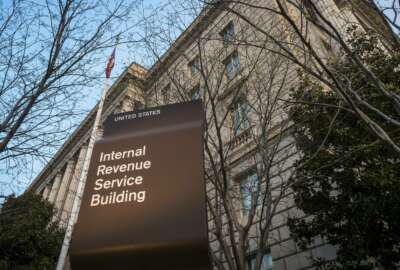Hubbard Radio Washington DC, LLC. All rights reserved. This website is not intended for users located within the European Economic Area.
IRS takes steps to avoid tax return processing delays as filing season starts
The IRS, looking to avoid unnecessary processing delays at the start of this year's filing season, is sending letters to taxpayers who received an Economic Impa...
The IRS, looking to avoid unnecessary processing delays at the start of this year’s filing season, is sending letters to taxpayers who received an Economic Impact Payment or child tax credit payment in 2021.
IRS Commissioner Chuck Rettig told reporters on Monday that most people who file an error-free 2021 tax return online and request a direct deposit will receive their refund within 21 days.
The IRS, he added, is taking “an all-hands-on-deck approach” to working through its backlog of tax returns, and making refunds a priority in this workload.
“We know people are struggling. We want them to know that we are doing everything that we can to help. We want to deliver refunds quickly, we want to serve as many people in the manner that they deserve, and we want to work to catch up on past tax returns that have been affected by the pandemic.”
However, the IRS started this year’s filing season while continuing to deal with a significant backlog of unprocessed tax returns from last year’s filing season, as well as a volume of phone calls that outpaces what the agency’s workforce is able to handle.
As of late December, the IRS had a backlog of about 6 million unprocessed individual tax returns and 5 million pieces of taxpayer correspondence.
Rettig said the IRS continues to receive millions of more calls than it can handle with its current level of staffing, and given the pandemic’s impact on call centers.
“As you know, our phone lines have been jammed, and our phone lines, we anticipate, will continue to be jammed for the foreseeable future. There are many, many reasons, but the demand is significantly up,” Rettig said.
Rettig said the IRS currently has no intention of expanding the filing season beyond the current April 18 deadline. Taxpayers can still request an extension to file by Oct. 15.
The IRS, meanwhile, is urging taxpayers to avoid filing a paper tax return, if possible, to reduce processing times. The IRS has yet to process millions of pieces of mail.
“We cannot stress this enough, there will again be delays with respect to paper tax returns this year,” Rettig said.
To reduce discrepancies between the revenue taxpayers report and the figures the IRS has on file, the IRS is sending letters to individuals who received an Economic Impact Payment (EIP) or child tax credit payment in 2021.
The letter outlines the payment amounts received by the taxpayer, according to IRS records.
IRS Wage and Investment Commissioner Ken Corbin, who also serves as the chief taxpayer experience officer, said the agency is looking into some press reports that claim the amount listed on these IRS notices, in some cases, doesn’t match what taxpayers actually received.
Corbin added that the IRS doesn’t believe that these reports are a “widespread problem.”
“I would encourage taxpayers to file the most accurate return possible. And if they are looking at the letter, and they say that they feel like their totals are different, and they have deposits or other information that shows that this is that amount that I should report, then they should report that,” he said.
Corbin said the IRS encourages taxpayers who haven’t yet received their 2020 tax returns to still file their 2021 tax returns this year.
In some cases, he said taxpayers may receive their most recent refund before the agency can process their 2020 refund.
“There will be situations where people will need to get their 2021 refund before their 2020 tax returns are processed. They shouldn’t worry about that. We are continuing to work on the 2020 returns,” Corbin said.
Taxpayers who file their 2021 taxes online, but haven’t yet had their 2020 return processed, should enter $0 as their adjusted gross income for 2020, Corbin said.
Despite the pandemic’s challenges on the IRS workforce, Rettig said the IRS is now more working remotely than it was in the early stages of the pandemic.
“The IRS of the past two years is different than the IRS of three years, or five years, or 35 years ago. The pandemic has brought the IRS to a nature where it had to assume certain risks in order to meet our mission, manage certain risks in order to distribute the stimulus payments — in order to distribute them, as the statute said, as rapidly as possible. I’ll be the first to say we did not always get it right, but I want you to know we were trying to always get it right,” he said.
Corbin said the IRS has its highest number of customer service representatives available to take calls, and that the agency is able to take more calls than it’s been able to in the past.
“What’s really causing people to not be able to get the service they’re looking for, and that they need from the IRS, is the amount of all demand that’s coming into the IRS,” Corbin said.
Last year, the IRS received almost 120 million calls, but would typically receive about 35 million calls in a normal year.
Corbin said the IRS answered about 41 million calls through its automated phone services, up from about 31 million in previous years.
Corbin said the IRS is continuing to hire throughout the filing season to add more customer service representatives and “provide the kind of service that taxpayers deserve.”
“We know this is a frustrating situation, and we are doing everything possible to continue working on this, while also making sure the current tax season goes smoothly,” he said.
Aside from pandemic challenges, the IRS faces growing demands to modernize its customer experience, despite a shrinking workforce and some of the oldest legacy IT systems in the federal government.
“For too long, the IRS has suffered too few resources to give the American people the service that they deserve,” Rettig said.
The Build Back Better Act would have given the agency $80 billion to significantly ramp up hiring over the next decade, with a focus on improving its enforcement operations. But the Biden administration’s spending package doesn’t currently have the support needed to pass the Senate.
Rettig, meanwhile, renewed his call to Congress to give the IRS the necessary funding to support a six-year IT modernization effort that has fallen behind schedule, as he previously warned lawmakers.
“We need consistent, timely multi-year funding so that our IT operations can be planned into that, rather than this start-and-stop approach to IT modernization,” he said.
White House Press Secretary Jen Psaki said Friday that the IRS is currently dealing with an “unacceptable backlog” of tax returns and that the “customer service that people are receiving is not what the American public deserves.”
“Many of those challenges are related to the pandemic but also due to years of underfunding from Congress. The agency has not been equipped with the resources it needs to adequately serve taxpayers in normal times, let alone during a pandemic,” Psaki said.
Sen. Mark Warner (D-Va.) sent a letter to the IRS and Treasury Department on Monday, asking how the agency is preparing to chip away at its backlog of unprocessed 2020 tax returns, now that the agency is accepting 2021 tax returns.
“Persistent delays harm taxpayers who are waiting for their returns to process — often those who need their refunds most — and the agency has an obligation to implement a clear plan that alleviates this backlog while avoiding major delays for the processing of filed returns during the 2021 tax filing season,” Warner wrote.
Copyright © 2024 Federal News Network. All rights reserved. This website is not intended for users located within the European Economic Area.
Jory Heckman
Jory Heckman is a reporter at Federal News Network covering U.S. Postal Service, IRS, big data and technology issues.
Follow @jheckmanWFED
Related Stories
IRS needs multi-year funding to overcome shrinking workforce, managers association warns
Related Stories
-
How the IRS is taking digital government to a new level IT Modernization





